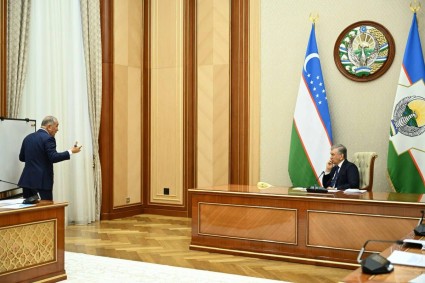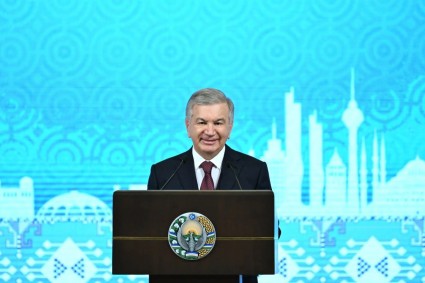The Senate at today’s session approved the resolution on holding the referendum on the draft Constitution in a new edition on April 30. The event was broadcast live.
Of the 83 senators, 80 supported the resolution, 1 abstained, and 2 did not vote.
The law on the Constitution must be published in the press within three days. The ballot paper will contain only one question: “Do you accept the Constitutional Law of the Republic of Uzbekistan “On the Constitution of the Republic of Uzbekistan”?”.
Nariman Umarov noted that the law expresses "long-term strategies for the development of our country, a solid legal framework and reliable guarantees for the future prosperous life of our country and people, and establishes the constitutional principle of Uzbekistan as a state of law."
“This will become a solid foundation for ensuring that everyone is equal before the law, and no one is above the law, for fair rulings at courts and, in general, for public authorities to serve the people,” the senator said.
He pointed out that the new Constitution was intended to change the principle "state - society - person" into "person - society - state", that is, "put the interests of the person above all else."
According to the document, the honor and dignity of a person are inviolable, nothing can be the basis for their discrimination.
Ambiguities in the legislation arising from the interaction of a citizen with state bodies will be interpreted in favor of the citizen.
According to the new Constitution, a citizen of Uzbekistan cannot be expelled from the country and transferred to another country.
In addition, it is determined that a person cannot be detained for more than 48 hours without a court order (principles of "habeas corpus"), and when a person is detained, his rights and grounds for detention must be explained to him in simple language (The Miranda Rules).
Article 7 introduces a "democratic" rule that the same person cannot be elected (appointed) to a certain position for more than two consecutive terms. These are the following positions:
- Speaker of the Legislative Chamber;
- President of the Senate;
- President of Uzbekistan (in accordance with the current Constitution);
- Chairman of the council of people's deputies of the region, district, city;
- Governor, mayor;
- Chairman and Deputy Chairman of the Supreme Court;
- Chairman and Deputy Chairman of the Supreme Council of Judges;
- Chairman of the Central Election Commission;
- Prosecutor General.
Nariman Umarov did not include the post of president in his speech, and then the head of the Senate, Tanzila Narbayeva, specified that the president was included in this list.
In particular, Article 7 of the constitutional law establishes that its provisions that change and (or) otherwise affect the terms of office, the procedure and (or) conditions for the election (appointment) of state officials, apply to these persons holding these positions upon entry constitutional law into force.
It is established that these persons have the right, on an equal basis with other citizens, to be elected (appointed) to these positions in accordance with the requirements of the Constitution, including the new Constitution, regardless of the number of terms of continuous office that these persons have held and (or) hold for moment of entry into force of the constitutional law.
“That is, this provision applies to all public officials, the procedure and (or) term for the election (appointment) of which are changed in the new version of the Constitution,” said Nariman Umarov.
In the Constitution, "special importance is attached to strengthening the powers of Parliament." In particular, the number of exclusive powers of the Legislative Chamber increases from 5 to 12, the Senate - from 14 to 18. Part of the president's current powers in terms of forming a system of executive and judicial power is transferred to the parliament.
The joint jurisdiction of the chambers will include such powers as hearing the annual national report on the fight against corruption, determining the maximum amount of public debt, and conducting parliamentary audits.
Duplication of functions in the activities of the chambers of the Oliy Majlis is to be eliminated. In particular, such powers as hearing the reports of the prime minister and members of the government, monitoring the execution of the state budget, hearing the report of the chairman of the Accounts Chamber are defined as the exclusive powers of the Legislative Chamber.
In turn, the Senate will receive the authority to elect the heads of anti-corruption and anti-monopoly bodies, approve candidates for the positions of the Prosecutor General, the Chairman of the Accounts Chamber, hear the reports of ambassadors, and will also be able to strengthen the supervisory powers of regulatory and law enforcement agencies.
To “strengthen the powers of the Senate” over the security services, a procedure is established for holding consultations on a candidate recommended by the president for the post of chairman of the State Security Service, and then appointing a candidate by the president.
In addition, in order to “ensure the true independence of the judiciary”, it is planned to introduce a system for electing all members of the Supreme Judicial Council by the Senate.
Today, governors and mayors simultaneously hold the positions of chairmen of the councils of people's deputies. The separation of powers in Tashkent and provinces will begin in 2024 (based on the results of elections to local councils), and in districts and cities - from January 1, 2026.
The number of senators is planned to be reduced from the current 100 to 65. This rule will come into force from the next convocation in 2024. At the same time, the current procedure for the formation of the Senate will be preserved, including equal representation from the regions.
In accordance with the draft of the new Constitution, the powers to consider and approve the candidacy of the Prime Minister are proposed to be transferred to the exclusive jurisdiction of the Legislative Chamber. Before presenting the candidacy of the prime minister to the lower house of parliament, a procedure is introduced according to which the president consults with all factions of political parties. After approval by the Legislative Chamber, the President appoints the Prime Minister.














